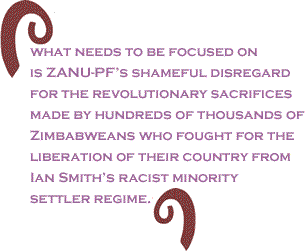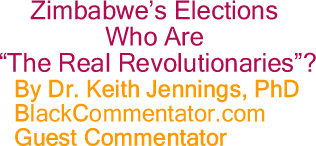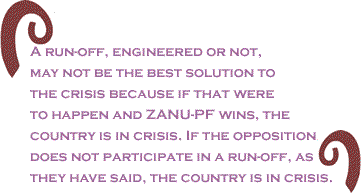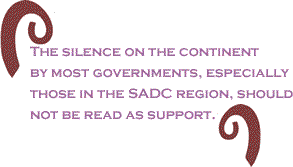
|
||||||||||||||||||||||
 |
||||||||||||||||||||||
 |
||||||||||||||||||||||
 |
||||||||||||||||||||||
 |
||||||||||||||||||||||
 |
||||||||||||||||||||||
 |
| The current issue is always free to everyone |
|
|
 |
Atlanta, Georgia. The failure to release the results of the March 29th polls by the Zimbabwe Electoral Commission is shocking and disgraceful, especially when one considers all the accusations made by western governments against the Mugabe Administration over the past few years that have been tossed aside as imperialist propaganda. Certainly the Bush Administration should be cautious in demanding the release of presidential election results when it took 40 days and the U.S. Supreme Court’s intervention to determine who won the 2000 elections in the United States. The same can be said of U.S. Secretary of State Rice calling anyone’s recent rule an “abomination,” given what U.S. foreign policy has been in the past eight years. Nevertheless, what needs to be focused on is ZANU-PF’s shameful disregard for the revolutionary sacrifices made by hundreds of thousands of Zimbabweans who fought for the liberation of their country from Ian Smith’s racist minority settler regime. Their struggle was also for the establishment of a sustainable democratic society. The leaders of the National Liberation Movement and the fundamental changes in the social arrangement they sought to achieve appear to have lost their way. Mr. Mugabe’s resentment of being lectured to by the British when he decided to retake lands originally violently stolen from the Africans by the colonial settlers or his settling scores with the British over the non-deliver of funds promised during the Lancaster House Agreement talks to buy back the land from the white farmers is understandable. That agreement was put in place to halt the outright military victory of ZANU and to protect the property rights of the minority white settler community. The Rhodesian system of apartheid was just as ruthless and effective as that established by the Afrikaners in South Africa. That system was supported by the United States, the United Kingdom (officially until the Universal Declaration of Independence was issued by Smith in 1965) and other western government, formally and informally. The burden of history is clear and the actions taken in that regard can be explained to reasonable people not oblivious to their own arrogant or racist views that might lead to them furiously saying, “How dare he treat white people like that, he has to be stopped.” The recent crackdown against human rights activists and civil society organizers, the arrest of Movement for Democratic Change (MDC) leaders, and the deployment of the military to prevent what was to be at best a symbolic general strike in a country with 80% unemployment, and the recent raids against white farmer, that has received widespread coverage in western media, has been decried, rightfully so, as a distraction and a ploy to take the focus off the real issue in Harare, i.e., the ability of the government dominated Election Commission to deliver a credible declaration regarding who won the presidential election in Zimbabwe. This would be the case whether the Commission declared Mugabe the winner or the opposition leader Morgan Tsvangirai the victor. While we are certain that some would be extremely happy with Tsvangirai being declared the winner by the Commission, others would be equally disturbed if Mugabe were declared the winner by the Commission. What is necessary is to find another solution for dealing with the problematic results. A run-off, engineered or not, may not be the best solution to the crisis because if that were to happen and ZANU-PF wins, the country is in crisis. If the opposition does not participate in a run-off, as they have said, the country is in crisis.
The opposition has claimed victory. They were declared the victors in the parliamentary contest. Therefore, one could reasonably conclude that they probably also won the presidential vote. While it is also possible that Mugabe won or that the election was so close that a run-off is necessary, the reality now is that few would believe anything the Commission says, given the way this entire process has been handled so far. This is the case despite a significant accomplishment, that should be acknowledged and was stated by the Zimbabwe government representatives at the recently held South African Development Community’s (SADC) extraordinary meeting on Zimbabwe, that the Mugabe government was able to successfully hold elections without any violence in a free and fair political environment. Certainly Zimbabwe is under siege by the western
media and western governments, in particular the United
States and the United Kingdom From a Diaspora perspective the situation looks terrible and volatile, just as Kenya did a few months ago following its December elections before the massive waves of violence broke out. How long does verification of ballots and investigation of irregularities take? The human rights violations cannot be ignored or easily dismissed. Accusations of government sponsored “torture camps” have been made by Human Rights Watch. If true, then this has to be condemned just like the U.S. run torture camp at Guantanamo Bay should be condemned and those running it held accountable. Everyone opposing the government is not a “sellout uncle tom” or “a lapdog of the imperialists.” The contradictions between the government and the people are antagonistic and cry out for a resolution. The lack of a ZANU-PF succession plan is a critical shortcoming that perhaps could have helped avoid much of what is being played out today. The silence on the continent by most governments, especially those in the SADC region, should not be read as support. The idea of non-interference in the internal affairs of a country still resonates with many leaders, as well as with some big powers such as China and India. Moreover, the land question exists in other countries in the region; in some cases it is as bad as or worse than in Zimbabwe. However, what they all know from their own liberation movement experiences is that the clock is ticking in Zimbabwe and that oppressed people will not remain oppressed forever.
Additionally, the MDC, which has been split for years over trivial matters, should be clear about its motivations and plans because once Mr. Mugabe is gone there are no guarantees that the West or the international financial institutions will rush in with aid and resources to “rescue” Zimbabwe. Therefore, Zimbabwean driven solutions have to be found and articulated. At independence on April 18, 1980 Bob Marley sang, “mash it up in Zimbabwe.” One line in that song was “soon we’ll see who are the real revolutionaries.” Soon is now. The results should not be released “tomorrow” because in this globalized world of ours, tomorrow is always today. BlackCommentator.com Guest Commentator Keith Jennings, PhD is President of the African American Human Rights Foundation. Click here to contact Dr. Jennings. © 2008 diasporapolitics.org
|
Your comments are always welcome. e-Mail
re-print notice
If you send us an e-Mail message we may publish all or part of it, unless you tell us it is not for publication. You may also request that we withhold your name. Thank you very much for your readership. |
|
| May
1, 2008 Issue 275 |
|
| Executive Editor: Bill Fletcher, Jr. |
| Publisher: Peter Gamble |
| Est. April 5, 2002 |
| Printer Friendly Version in resizeable plain text format format |
 |
 |
 |
| |
| |
































